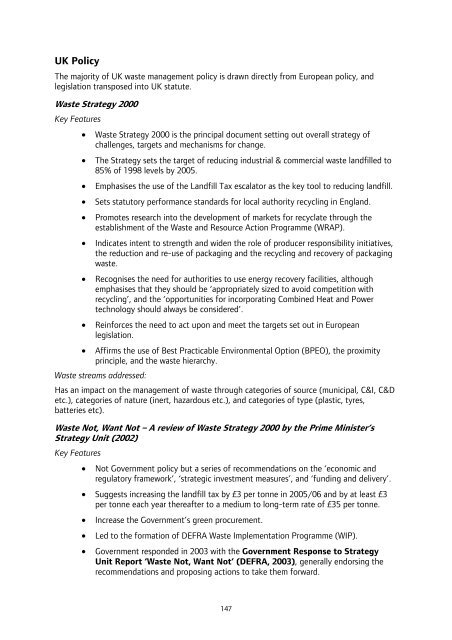London Wider Waste Strategy - London - Greater London Authority
London Wider Waste Strategy - London - Greater London Authority
London Wider Waste Strategy - London - Greater London Authority
Create successful ePaper yourself
Turn your PDF publications into a flip-book with our unique Google optimized e-Paper software.
UK Policy<br />
The majority of UK waste management policy is drawn directly from European policy, and<br />
legislation transposed into UK statute.<br />
<strong>Waste</strong> <strong>Strategy</strong> 2000<br />
Key Features<br />
• <strong>Waste</strong> <strong>Strategy</strong> 2000 is the principal document setting out overall strategy of<br />
challenges, targets and mechanisms for change.<br />
• The <strong>Strategy</strong> sets the target of reducing industrial & commercial waste landfilled to<br />
85% of 1998 levels by 2005.<br />
• Emphasises the use of the Landfill Tax escalator as the key tool to reducing landfill.<br />
• Sets statutory performance standards for local authority recycling in England.<br />
• Promotes research into the development of markets for recyclate through the<br />
establishment of the <strong>Waste</strong> and Resource Action Programme (WRAP).<br />
• Indicates intent to strength and widen the role of producer responsibility initiatives,<br />
the reduction and re-use of packaging and the recycling and recovery of packaging<br />
waste.<br />
• Recognises the need for authorities to use energy recovery facilities, although<br />
emphasises that they should be ‘appropriately sized to avoid competition with<br />
recycling’, and the ‘opportunities for incorporating Combined Heat and Power<br />
technology should always be considered’.<br />
• Reinforces the need to act upon and meet the targets set out in European<br />
legislation.<br />
• Affirms the use of Best Practicable Environmental Option (BPEO), the proximity<br />
principle, and the waste hierarchy.<br />
<strong>Waste</strong> streams addressed:<br />
Has an impact on the management of waste through categories of source (municipal, C&I, C&D<br />
etc.), categories of nature (inert, hazardous etc.), and categories of type (plastic, tyres,<br />
batteries etc).<br />
<strong>Waste</strong> Not, Want Not – A review of <strong>Waste</strong> <strong>Strategy</strong> 2000 by the Prime Minister’s<br />
<strong>Strategy</strong> Unit (2002)<br />
Key Features<br />
• Not Government policy but a series of recommendations on the ‘economic and<br />
regulatory framework’, ‘strategic investment measures’, and ‘funding and delivery’.<br />
• Suggests increasing the landfill tax by £3 per tonne in 2005/06 and by at least £3<br />
per tonne each year thereafter to a medium to long-term rate of £35 per tonne.<br />
• Increase the Government’s green procurement.<br />
• Led to the formation of DEFRA <strong>Waste</strong> Implementation Programme (WIP).<br />
• Government responded in 2003 with the Government Response to <strong>Strategy</strong><br />
Unit Report ‘<strong>Waste</strong> Not, Want Not’ (DEFRA, 2003), generally endorsing the<br />
recommendations and proposing actions to take them forward.<br />
147
















